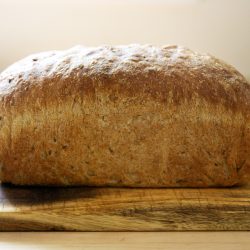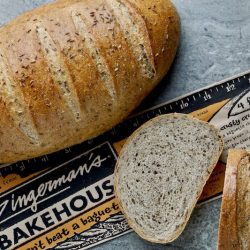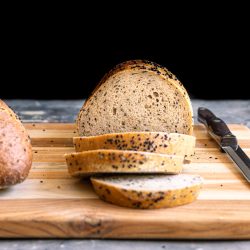Since late October, a substantial portion of Zingerman’s Bakehouse rye has been coming to us from our newest farmer collaborator, Molly Breslin. To be exact, at present, 100% of the rye in our Roadhouse bread, 100% of the rye in our Country Miche, 98% of the rye in the new and improved Vollkornbrot, and 25% of the rye in our family of Jewish rye breads is from Breslin Farms. It comes to us as whole berries, is milled by us in-house, and the resulting flour is kept whole, not refined by sifting out any of the bran. In case you missed it, we got a mill! You can catch up and read all about it here. This beautiful mill needs beautiful grains to fulfill its destiny and in Molly Breslin’s rye we have found just that. Originally, we had plans to use Michigan rye for our inaugural milling exploits, but when nature had other ideas we expanded our local rye search and happily connected with our midwestern neighbor, Molly, in Ottawa, Illinois.
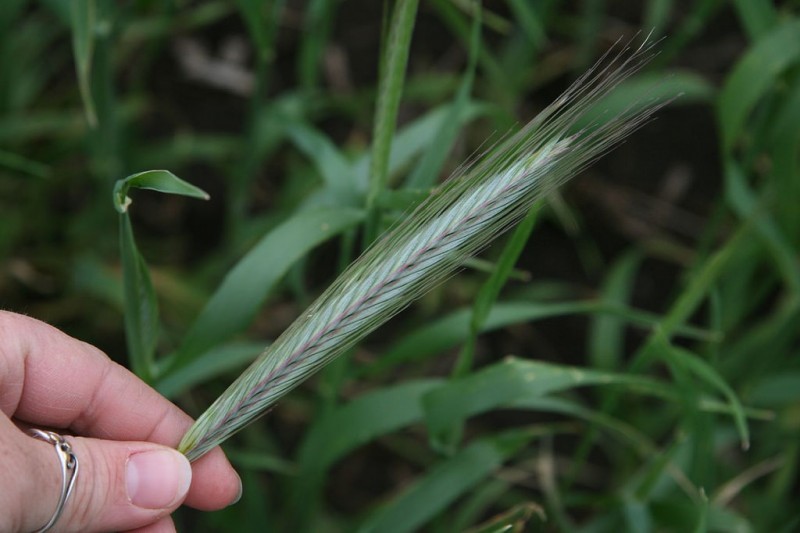
Across the local food discourse, from the ecological and sociological literature to foodie memoirs, 100 miles is often used as the boundary that divides local food from everything else. Here at the Bakehouse, we are some 300 miles from where Molly grew our rye berries. This rye might not meet the somewhat polarizing textbook definition of “local,” but we believe other metrics measure local, too. For us, the most compelling aspect of “local food” is the ability to know more about the way something is grown and the farmers that grow it and to be in a real relationship with those important and too often undervalued people. This component of localness knows no exact geographical boundaries and can be engendered in surprising ways. The midwest growing region spans much more than 100 miles but is its own small world. After talking to Molly, we almost immediately discovered that the apple orchard, Earth First Farms, where she worked for 5 years, was also one of the study sites in my master’s thesis. Talking on the phone with Molly, I immediately felt a closeness to her and, even without a shared professional past, I think you would, too. After all, three hundred miles are nothing when we find someone with a commitment to sustainability, mastery of craft, and love of baking that are so closely aligned with our own.
In fact, when I asked Molly if she liked to bake, she informed me that it was actually her lifelong love of baking that inspired her to become a grain farmer in the first place. Much of her family folklore is centered around baking, and she vividly recounted for me the legend of her father’s grandma baking German sourdough in a big roasting pan, carving the huge loaf right at the table, and then using the knife to stab and fling the slices to the awaiting family, piece by piece. Foreshadowing her eventual career, Molly’s dad, John Breslin, returned to these baking roots by crafting his own sourdough starter shortly after she was born. Molly grew up to love baking and had long been committed to buying local and organic fruits and vegetables but was unable to find similarly sourced grains. So, like the start of so many entrepreneurial adventures and heroines’ quests, she decided to do it for herself.
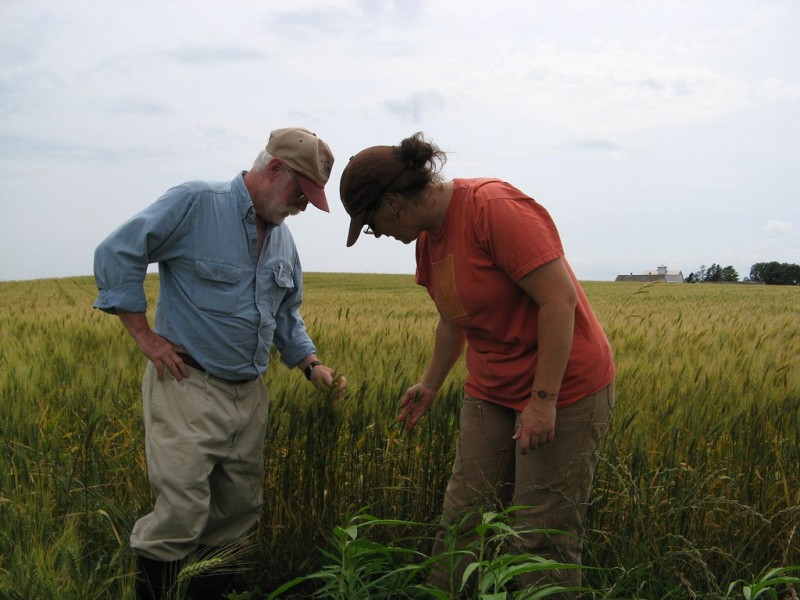
This self-reliant spirit serves her well in a male-dominated field, no pun intended. As destiny would have it, the land she now farms belonged first to her mother’s family and is a matrilineal legacy over which Molly presides. Though the 100 acres of land came from her mother, Peg, she has worked closely to farm it with her father, John, since 2010. Molly admits this aspect of their father-daughter relationship has not been without its challenges. She attributes some of the initial friction to very different leadership styles—she gained many of her interpersonal skills from housing co-operatives in college, while he learned how to navigate teamwork while serving in the U.S. Army. Nine years later, these differences have been resolved and John is known for deferring to Molly with a good-natured “it’s your farm, I just work on it.”
Beyond navigating this father-daughter dynamic, being a woman in a typically male role, at least in recent history, comes with some additional challenges. For example, there are no bathrooms out in the field and no maternity leave when you’re self-employed, which can put a lady into some literally and figuratively uncomfortable positions. Oh the glamor of womanhood! To any new farmer moms out there, Molly recommends a hand pump because, and I quote, “I started using a hand-pump to pump breast milk because it was more versatile—I could pump with one hand while checking the oil, scouting for bugs, or operating the combine.” In other words, Molly is an intrepid pioneer. Though requiring some multitasking, Molly believes the very distinctiveness of being a woman who farms actually allows her to more easily deviate from farming norms and do as she pleases. With no preconceived notions or expectations about how a woman farmer does business, she feels her traditional community is less shocked or bothered by her organic methodology and commitment to somewhat unconventional agricultural priorities than if she were a man. While the freedom to do her own thing is appreciated, she does question whether it hampers her ability to lead by example and convert her neighbors to organic farming.
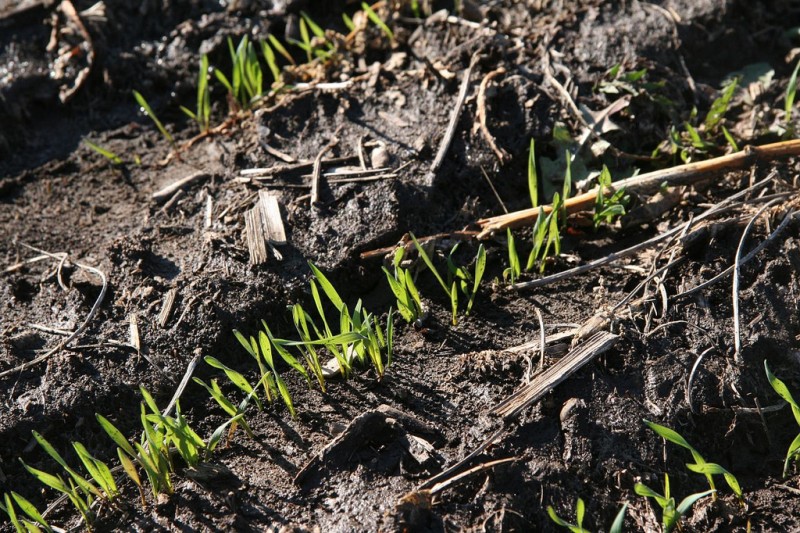
As an organic farmer who has never considered farming conventionally, something we especially appreciate about Molly is that soil regeneration is central to her agricultural philosophy and game plan. Everything she does starts from the proverbial ground up and when asked about her management strategy, she responds immediately with a firm and elegant motto: “soil health is plant health is people health.” To this end, her first crop year was black beans to prep the soil for wheat, build organic matter, and fix nutrients. Ever since then, the entirety of her management strategy is truly predicated on this assertion, with her hands-off pest management made possible by plants that are healthy enough to fight pests for themselves. Rather than spending time, energy, and money defending plants from insects and fungus, Molly focuses her resources on achieving healthy soil. She does this primarily by maintaining a 3-year crop rotation, cover cropping, and frequent soil testing paired with very small and targeted nutrient additions. Of the crops in this 3-year rotation, rye is usually the most reliable and low maintenance. The type of rye we received from Molly is VNS, an acronym that stands for “variety not stated.” Using VNS rye allows seed to be saved each year without any legal issues. This is important for many reasons, not least of which is that it means they’ve grown their seed stock up over several years so it’s biologically acclimated to Ottawa, Illinois, and represents a flavor unique to their location and management. Seed saving and grain terroir go hand in hand.
Because of this terroir, this particular rye’s flavor tells a story. It represents the taste of years of seed going straight into the northern Illinois ground without tilling, coming up in the fall through richly built organic matter that it will hold onto through the winter, flowering in the spring with heads that Molly says look like shiny purple fish scales, and will be pollinated via the wind, and spending the summer drying down in the field. This rye is the taste of Illinois, of organic methods, of diversity in farming, of a baker who got her hands dirty, of local food. We think it is a tale as delicious as it is intrepid and savoring of kismet, we are proud to use it for our freshly milled, whole grain rye flour. If you haven’t tried it yet snag some Roadhouse bread; Jewish, Onion, or Caraway Rye; Pumpernickel; Country Miche; or Vollkornbrot. Check our baking schedule for availability.
By Hailey Schurr
Bakehouse Sourcer-ess
Photos by Molly Breslin
Bakehouse Sourcer-ess
